Posts Categorised: Food
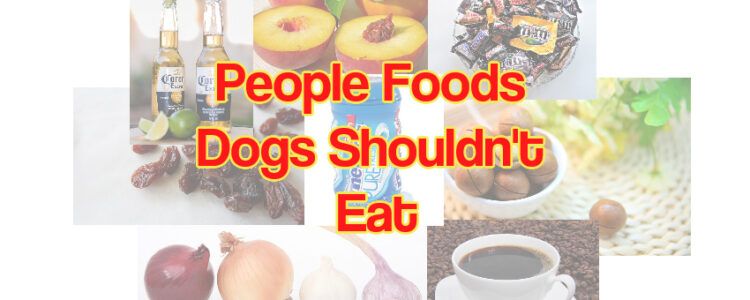
Super Bowl, March Madness and many exciting games are coming up. Do you put out snack foods and drinks so you don’t miss any of the action? If you do, I’d bet you unintentionally include some people foods dogs shouldn’t eat.
Although sometimes it seems like dogs can eat anything – yeah, even that – they really shouldn’t. Just ask your veterinarian what they’ve had to surgically remove – probably lots of socks, toys, rocks and more.
The problem is some people foods can make them sick or even die.
And unfortunately it’s not that uncommon. According to WebMD, there are “more than 232,000 pet poisoning” cases in the United States every year.
POTENTIALLY DEADLY FOODS
Dogs have different digestive systems and dietary needs than we do. So, although we might eat these foods regularly, they can be poisonous and even deadly for dogs.
- Alcohol
- Chocolate
- Coffee, tea, soda, energy drinks
- Fruit pits
- Garlic, Onion, Chives
- Macadamia nuts
- Raisins, grapes, currants
- Xylitol
If you think your dog ingested one of these items, contact your veterinarian for advice. If that’s not possible, call:
ASPCA Animal Poison Control Center
Or
The Pet Poison Helpline
There may be a fee for help from the above hotlines.
COMMON SYMPTOMS
Depending on what your dog ate, symptoms may start quickly or may take a few days. Here are some symptoms to watch for:
- Excessive vomiting and/or diarrhea
- Bloody urine or stool
- Inability to go to the bathroom
- Lethargy
- Irregular heartbeat
- Difficulty breathing
- Agitation
- Obvious signs of pain
- Seizures
- Collapse
If your dog ate one of the potentially deadly foods or if you see any of the above symptoms, get him to your veterinarian quickly. The sooner treatment is started, the better the chance of a good outcome.
MORE ABOUT THE POTENTIALLY DEADLY FOODS

Alcohol
Some people think it’s harmless or maybe even funny if a pet gets drunk. What they fail to realize is their different metabolism, and often smaller size, makes dogs more susceptible to the effects.
Dogs seem to be more attracted to the sweeter drinks, such as eggnog, pina colada and daiquiri. However beer is also well liked.
Also be careful with foods that might contain alcohol, such as rum balls at Christmastime. And rotting or fermenting fruit, such as plums that fell from the tree, can cause similar symptoms.
Like people, dogs may be uncoordinated, may vomit or have diarrhea. At higher doses, dogs may have trouble breathing, tremors, heart arrhythmias, low blood pressure, coma and even death.

Chocolate
Yes, yummy chocolate is toxic to dogs. A substance in chocolate, called methylxanthines, contains both caffeine and theobromine. These are stimulants and can cause vomiting, diarrhea, hyperactivity, tremors, pancreatitis, irregular heart function, seizures and even death.
The darker the chocolate, the more dangerous it is for dogs, with baking chocolate having the highest levels of methylxanthines. Some chocolate products may also have other toxic ingredients, such as Xylitol or high amounts of caffeine.
Also be careful of foods that might contain chocolate – ice cream, cookies, cake and other sweets. And be aware on holidays, such as Valentines Day, Easter and Christmas, as chocolate is commonly given as gifts.
If your dog ingests any type of chocolate, even in small amounts, you need to call your veterinarian as soon as possible. Symptoms can take awhile to start – anywhere from a few hours to a day.

Coffee, Tea, Soda, Energy Drinks
Caffeine is the major culprit in these drinks. A small sip may not cause any harm, but ingesting a large amount can cause an increase in heart rate, abnormal heart rhythms and elevated blood pressure. Symptoms usually start within one to two hours after ingestion.
Other symptoms include vomiting, diarrhea, difficulty breathing, tremors, seizures and even death.
Pets are more sensitive to caffeine than we are. Other potential ingredients in these drinks that can cause harm are Xylitol and high levels of sugar.
Coffee grounds (often used in gardens), coffee beans, instant granules, tea bags, loose-leaf tea are all more concentrated than a sip of a drink. If your dog ingests any of these, call your veterinarian right away.
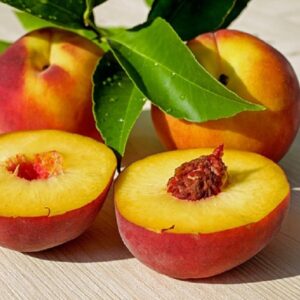
Fruit Pits
Slices of fruit are generally fine for dogs, but don’t give them whole fruit because seeds and pits contain poisonous cyanide. This includes apples, apricots, cherries, plums, peaches and other fruit with pits.
One or two apple seeds are probably not harmful, especially if they’ve been swallowed and not chewed. But what dog can resist chewing? Chewing releases the cyanide which blocks red blood cells from transporting oxygen. It’s safer for your dog if you slice and remove the core before giving it to him.
Symptoms to watch for include vomiting, panting, bright red gums, difficulty breathing, shock, dilated pupils, irregular heart beat, increased heart rate, seizures, coma and even death.
Canned and preserved fruit often have high amounts of sugar, preservatives or artificial sweeteners which can cause an upset stomach. Dried fruit, such as prunes, can also cause digestion issues.

Garlic, Onion, Chives
It may be hard to believe, but plants from the Allium family – including onions, chives and garlic – are not safe for dogs to eat. They contain sulfoxides and disulfides which can damage red blood cells. Damaged red blood cells can’t carry oxygen around the body which leads to anemia.
Garlic contains higher levels of these compounds and is thus more toxic to dogs. A bite of garlic bread might not cause any problems, but raw bulbs of garlic are more concentrated and dangerous. One onion is enough to cause toxic effects. Green onions and chives are less concentrated, but can be dangerous if your dog consumes a large amount.
All parts of these plants – bulbs, leaves, juice and processed powders – are toxic to dogs.
These are also common ingredients in many prepared foods, such as pizza, spaghetti, soups, stews and various meaty dishes. Be careful with leftovers too.
Symptoms can include pale gums, weakness, excessive drooling, discolored urine, gastrointestinal irritation, vomiting, diarrhea, anemia and collapse. It may take awhile, so if you think your dog may have eaten some watch for symptoms for at least a few days.

Macadamia Nuts
According to the American Kennel Club, “These are some of the most poisonous foods for dogs.”
They are a common snack food and can be found in trail mixes and baked goods. It only takes a few nuts to cause severe poisoning. However why these nuts are so toxic to dogs is unknown.
Macadamia nuts can cause depression, weakness, vomiting, abdominal pain, tremors, high fever, lethargy and inability to walk (particularly with the hind legs) and increased heart rate. Symptoms usually appear within hours after ingestion and may last for 24 to 48 hours.
If there’s a chance your dog ingested some, call your veterinarian right away.
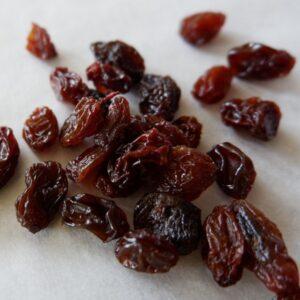
Raisins, Grapes, Currants
Although still surprising to some dog owners, raisins, grapes and currants are extremely toxic to dogs. They can cause severe liver damage and kidney failure. Some dogs have died after eating less than a handful of raisins.
Why they are so toxic to dogs is still a mystery. As is why some dogs develop severe symptoms while other dogs can ingest some and seem fine.
According to Merck, “Most dogs with raisin or grape toxicosis develop vomiting and/or diarrhea within 6-12 hours after ingestion of grapes or raisins. Other signs include lethargy, anorexia, abdominal pain, weakness, dehydration, polydipsia, and tremors (shivering).”
More severe symptoms may be seen in 24-48 hours with severe kidney damage.
Raisins are found in many baked goods, such as fruit cakes, raisin bread, bagels, cakes and cookies. They’re also in cereals and trail mixes. Grapes are made into jellies and juice. If you grow grapes or currants make sure your dog doesn’t have access to that area.
Call your veterinarian immediately if you think your dog may have eaten anything containing raisins, grapes or currants.
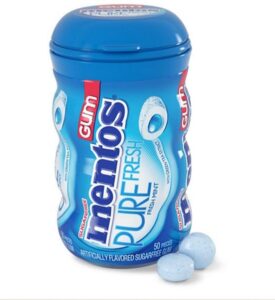
Xylitol
White sugar is bad for you. So instead food processors are making sugar-free products using a substitute originally made from wood chips or straw. It’s called Xylitol and is an ingredient in many gums, breath mints, candies, desserts, toothpastes and mouthwashes. It’s also found in pet mouth wash and oral rinses!
Unfortunately it can be deadly for dogs.
Xylitol can cause a spike in insulin, leading to a rapid drop in blood sugar levels in dogs. If sugar levels drop too low, your dog could become hypoglycemic with potentially harmful side effects. A higher dose can be life-threatening within minutes.
According to the Pet Poison Helpline, “to achieve a potentially toxic dose, a 10 pound dog would only have to eat one piece of gum!”
Reports of dog poisoning cases involving Xylitol are increasing.
Symptoms may develop within minutes of ingesting Xylitol. Blood sugar drops, the dog could start vomiting and staggering. Collapse and seizures are also possible. Some dogs may not show signs for hours, perhaps because of ingesting a smaller amount.
Within a few days some dogs have developed liver failure. Some dogs have died.
The quicker the dog receives treatment, the better his chance of surviving. He will likely be made to vomit, receive fluids and frequent tests of his blood sugar levels and liver function. This is in-hospital care.
OTHER PEOPLE FOODS DOGS SHOULDN’T EAT
Snacks
Potato chips, pretzels and salty snacks:
These products are often very salty which makes pets thirsty and in turn causes urination. Sometimes in the house.
Too much salt can be extremely toxic. Symptoms include vomiting, diarrhea, depression, tremors, loss of coordination, abnormal fluid accumulation, increased body temperature. Higher doses can damage the kidneys and may lead to seizures, coma and death.
Soups and stews can also be high in salt. Driveway de-icers can also contain a high amount of salt.
If your dog has ingested a lot of salt and has any of the symptoms, contact your veterinarian immediately.
Nuts:
Can be dangerous if not chewed well. Salted peanuts can be dangerous if the dog eats many. See the issues with salt above.
Pizza:
A small bite of plain pizza or bread (no spices, garlic, onion, spicy processed meat) should be fine. However the dough is not nutritious and the tomato-based sauce and common toppings can cause health issues. Never give pieces containing garlic or onions.
Popcorn:
Unsalted and unbuttered popcorn is fine in moderation, but make sure there aren’t any unpopped kernels that could be a choking hazard.
Candy:
Don’t give these to dogs. Hard candies can be a choking hazard. Some candies may contain Xylitol which is toxic to dogs. Chocolate can be deadly.
Dairy
Milk:
When puppies are weaned, they no longer need milk. Some dogs can digest milk, but many dogs are lactose intolerant and shouldn’t be offered milk or any dairy product. Symptoms can include diarrhea, vomiting and/or gas, allergic reactions and even pancreatitis.
Cheese:
It’s generally fine in small amounts, except for dogs that are lactose intolerant. It’s also high in fat, so give it sparingly.
Ice cream:
This is a common treat, but some dogs are lactose intolerant. It also contains a lot of sugar and fat. Offer it sparingly, if at all. Also some flavors can be toxic, such as flavors containing chocolate and/or raisins.
Yogurt:
If your dog can digest dairy products, plain yogurt is an acceptable snack. However as in ice cream, be aware that some flavors can be toxic to dogs.
Fatty Meats
Bacon grease:
Avoid giving your dog leftover fat and grease as too much can lead to stomach upsets or even pancreatitis. An inflamed pancreas is painful and may require hospitalization and IV fluids. Some breeds are prone to pancreatitis.
Gravy:
Gravies are often fatty and salty – either of which can irritate your dog’s stomach. They may also contain toxic ingredients such as garlic or onions. However you can make or buy a very lightly seasoned gravy for a finicky eater.
Poultry skin, Ham and other fatty cuts:
As with bacon grease, it’s better to throw these items out.
Other
Avocado:
Some people believe dogs should not eat avocados. This is because the skin, pit and leaves contain a toxin called persin. However dogs and cats can eat it. But “other animals, particularly birds, will find avocado toxic.”
Avocados do provide health benefits, but to be safe only give your dog small amounts and only the meat. Remove the skin, pit and any leaves. Dispose of those pieces in a way other animals can’t access them.
Also avoid giving your dog avocado products, such as guacamole, because they often contain ingredients – such as onion – that are harmful to dogs.
Chili peppers:
Don’t give these to dogs. Although they aren’t toxic to dogs, they can irritate their stomach and intestines. They can cause stomach cramping, bloating, vomiting, drooling and/or diarrhea.
Citrus fruits:
Don’t give these to dogs. Lemon, limes, oranges and grapefruits have toxic compounds in the skin and seeds and can cause vomiting and diarrhea.
Cooked bones:
Don’t give these to dogs. Cooked bones can splinter and cause punctures in the stomach and/or intestines. They can also cause choking, digestive upsets and blockages.
Human vitamins and medications:
“Do not give human medications to your animal unless directed by the vet.”
Some medications meant for people may not work for dogs. They may cause adverse effects, including death.
Mushrooms:
White mushrooms from the grocery store should be okay to give your dog, but don’t let him eat any mushrooms growing wild. “Veterinarians recommend treating all wild mushrooms as potentially toxic and a veterinary emergency.”
Nutmeg:
Don’t give this to dogs. Nutmeg contains myristicin which can cause high blood pressure, increased heart rate, abdominal pain, hallucinations and seizures. If your dog does get into the nutmeg shaker or the pumpkin pie, contact your veterinarian for help.
Potatoes and Tomatoes:
Avoid giving your dog potatoes or tomatoes as both belong to the nightshade family of plants and can be toxic. A ripe tomato should be fine, but the rest of the plant and green tomatoes contain toxic solanine. A cooked potato should be fine, but a raw potato, particularly one that has sprouted or turned green is toxic. Leaves and stems are also toxic. Never give raw potato peelings.
If you grow either in your garden, make sure your dog can’t access them. Stems, leaves and green tomatoes contain higher amounts of solanine. Immature potatoes also contain higher amounts of solanine.
Symptoms of solanine poisoning include vomiting, diarrhea, lethargy and even seizures. Ingesting large quantities can cause a slowing of their heart rate, vision issue and possibly heart issues.
Rhubarb:
Leaves are toxic and ingestion could cause kidney failure. Symptoms include drooling, vomiting, diarrhea, trembling, bloody urine, lethargy, coma and even death. The leaves are bitter tasting so most dogs will avoid it. If you have rhubarb in your garden make sure your dog can’t access it.
Tobacco:
Although it’s not a food, dogs have ingested cigarette butts, chewing tobacco and liquid nicotine. Symptoms include excessive drooling, tremors, excitement, vomiting, diarrhea, increased heart rate, rapid breathing, constricted pupils, agitation, seizures, blue gums, coma and even death.
Yeast dough:
Yeast is what causes dough to rise. If a dog ingests the dough it may continue to rise and cause gas to accumulate in his digestive system. This can cause severe pain and possibly torsion or rupture of the stomach – a life-threatening emergency. Contact your veterinarian or emergency clinic.
Additionally the yeast and sugar in raw dough ferments and becomes a type of alcohol that can cause alcohol poisoning. Contact your veterinarian if your dog has a swollen belly, stomach pain or is trying to vomit.
—
The information in this article is not intended to diagnose or treat a health issue. Please contact your veterinarian if you have any questions about your dog’s health.
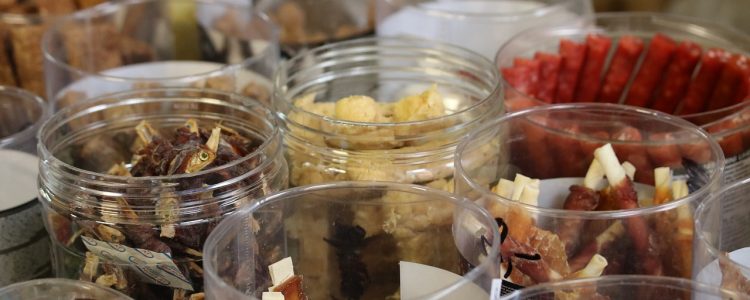
Whether you’re worried about the ingredients in commercial treats or you just want to do something special for your favorite four-legged companion, here are some simple recipes to make great tasting dog treats!
We’ll start with a favorite – yummy peanut butter treats!
Make them as-is or switch out the milk and peanut butter for a cup or 2 of pureed pumpkin. Or try switching rice flour for the wheat flour. Then see which one your dog likes best!
Yummy Peanut Butter Treats
INGREDIENTS
2 eggs
1/2 cup nonfat milk
1 cup creamy peanut butter
2 1/2 cups flour, whole wheat
1/2 Tbsp baking powder
1/2 tsp ground cinnamon
DIRECTIONS
Preheat oven to 350 degrees F.
Mix together the eggs, milk and peanut butter in a large bowl.
Gradually add flour, baking powder and cinnamon, using your hands as necessary, until the dough is stiff.
Sprinkle some flour on a work surface and roll out the dough to 1/4-inch thickness. Cut into 1/2-inch squares or dress it up with a bone-shaped cookie cutter. You don’t want your family to mistake them for people cookies!
Bake in preheated oven about 20 minutes. Turn over and bake for 15 minutes more.
Cool completely before storing in an airtight container.
If your dog suffers from allergies, here’s a recipe that he can enjoy without having to scratch. Instead of flour or oatmeal, it’s made with black beans.
Because of their soft texture, these cookies are also good for dogs that have trouble chewing the harder biscuits.
Anti-Itch Doggie Cookies
INGREDIENTS
1 cup cooked black beans, rinsed well and drained
1/4 cup creamy peanut butter
1/2 ripe banana, mashed
1/4 cup unsweetened applesauce
DIRECTIONS
Mash black beans using a fork or food processor. Add peanut butter, banana and applesauce. Stir until smooth. Cover and refrigerate 1 hour.
Preheat oven to 325 degrees.
Drop by rounded teaspoon onto nonstick cookie sheet and bake for 15 minutes. Remove sheet and flatten using the back of a spoon.
Return to the over and bake for 10 minutes. Turn cookies over and continue baking 15 more minutes.
Cool completely then store in an airtight container or freeze.
For a slightly different flavor, try substituting lentils for the black beans.
If it’s too hot or you just don’t feel like firing up the oven, you’ll love these easy-to-make treats!
Coconut Blueberry Frosty Treats
INGREDIENTS
1/2 cup coconut oil in solid form
Frozen blueberries
DIRECTIONS
Put a blueberry into each heart in the silicone mold. Set aside.
In a small saucepan, heat coconut oil until it liquefies.
Allow coconut oil to cool for a few minutes, then carefully pour oil into the heart mold.
Carefully place mold into the fridge to solidify.
When coconut oil treats are solid, pop them out of the mold.
Store coconut oil treats in a baggie in the freezer.
You can get a silicone mold to make heart-shaped treats here. Or pull out those old plastic ice cube trays, just don’t try to use a metal one because it needs to flex to remove the treats.
Here’s a simple grain-free recipe your dog will love!
Banana Almond Bites
INGREDIENTS
1 large egg
1/2 cup almond butter
1 banana, over ripe
1 tsp cinnamon
DIRECTIONS
Preheat oven to 350° F.
Using a fork, mash the banana in a large size bowl.
Add the remaining ingredients and mix together with a fork until blended. The batter should be thick and gooey.
Line a cookie sheet with parchment paper and place teaspoon-size dollops well-separated on the sheet.
Bake for 5 minutes, then turn the pan and bake for another 5 minutes.
Remove from the oven and cool. Be sure to refrigerate!
Here are some other ideas for treats:
- Baby carrots
- Sweet potatoes, sliced
- Apples, sliced
- Strawberries
- Watermelon, seedless
- Banana, peeled
- Eggs
- Sardines
- Cottage cheese
- Unflavored yogurt
- Chicken liver
- Chicken gizzards
- Broccoli, sliced
- Cauliflower, sliced
You might be surprised at what your dog likes. Most of my dogs love broccoli and cauliflower, but don’t like bananas! Go figure!
If you don’t have time to make your own treats, check out this post for quality store-bought dog treats.
Affiliate Links: This blog contains affiliate links.

You think your dog works hard? Check out these dogs who rack up over 3,000 miles conditioning in just 6 months and then run 150 miles a day for over a week in competition.
Mitch Seavey, has won the Iditarod THREE times (2004, 2013 and 2017) and holds the record as the oldest person to win.
His son, Dallas, has won the Iditarod FOUR times (only one person has ever won it 5 times) in 2012, 2014, 2015, 2016.
Dallas holds the record for the youngest person to win. Mitch also came in second to Dallas in 2015 and 2016 and 3rd in 2014 when Dallas won and Dallas came in second to Mitch in 2017.
They’ve also smashed the winning time record over and over. Mitch currently holds the record at 8 days 3 hours 40 minutes 13 seconds. They are the first father and son duo in Iditarod history to claim the top two finishing positions of the race. Between them they’ve won the last 6 Iditarod races.
So why would I – a Lab person – tell you about sled dogs? Well, if a top musher chooses Dynamite products for his dogs it might be something for you to consider.
“We use Dynamite products year round in the kennel to maintain healthy, thriving dogs. The nutritional vitamin and mineral supplements are a key element in our their successful performance and great overall health,” says Dallas Seavey.
What other products does he use?
He says he’s had great success treating viral and bacterial infections “with activated Miracle Clay, Solace, Dyna Pro, and Trace Minerals Concentrate every 3 hours around the clock until well.”
Let me know if you have any questions about any of these Dynamite products!
Image courtesy Dynamite Specialty Products

Who doesn’t love to give treats to their dog? But with so many commercial treats, it can be hard to make a good choice. Start off by looking for quality ingredients.
Signs of better quality:
- Natural preservatives (such as Vitamin C or E) or no preservatives at all
- Made in the USA
- Fresh, whole ingredients (human-grade, if possible)
Ingredients to avoid:
- Corn and wheat
- “Meal” and “by-products”
- BHA (Butylated Hydroxyanisole)
- BHT (Butylated Hydroxytoluene)
- Ethoxyquin
- Food Dyes (Blue 2, Red 40, Yellow 5 and 6, 4-MIE)
- PG (Propylene Glycol)
- Rendered fat
Consider where the treats are made
There have been on-going problems with pet food and ingredients coming from China. In 2007, there was a massive recall of Chinese-made pet food. Several thousand dogs became sick or died from food containing melamine – a type of plastic. The ingredient was traced back to a Chinese firm that was adding melamine to their food products to increase the protein percentage for bigger profits.
In 2014 there was another health issue that traced to Chinese pet treats. This time it involved imported jerky treats that were linked to over 1000 dog deaths.
Because of these problems, you should avoid pet food products imported from China. Unfortunately labeling laws don’t cover ingredients that come from China. Some manufacturers have imported base ingredients because of the lower cost and mixed them with other ingredients to make pet food in the US. These products can be labeled as ‘Made in USA’ without mentioning the Chinese ingredients.
Check the manufacturer’s reputation
You can search online for recalls, not just for the particular treat you’re considering, but for the entire product line. A manufacturer with several recalls may indicate an overall problem with quality control.
Check the calorie count
Just like people, there are many overweight dogs. Obesity causes all sorts of health issues, from heart disease and high blood pressure, to diabetes and joint damage.
Regardless of which treats you choose, be sure to subtract the calories in the treats from your dog’s daily calorie allowance. Many treats have lots of calories and feeding just a few every day will lead to weight gain.
If you’re not a calorie counter, do the touch test every couple of weeks. Lay the palms of your hands on your dog’s rib cage. If his ribs are sticking out, he’s too thin. If you have to press in to feel the ribs, he’s too fat.
What tastes best to your dog
For that you may have to try a few different treats, but I don’t think he’ll mind this kind of testing!
Here are some treats that score high in our consideration:
Newman’s Own Organics Premium Dog Treats
Heart-shaped, crunchy organic dog treats that come in a wide variety of flavors, including Chicken, Peanut Butter, Salmon and Sweet Potato, Turkey and Sweet Potato, and Cheese. They also come in small (1″) and medium (1.5″) sizes.
- No artificial flavors, colors or preservatives
- No wheat, soy or corn
- Made in Canada
- And the company gives 100% of profits to charity. Over $500 million so far!
“The dog loves them. They are scored to be easy to break in half for smaller dogs or for training nibbles. On ‘subscribe and save,’ the price is very good.” ~ LaRaine
Riley’s Organic Dog Treats
Bone-shaped treats that come in small and large size with a crunchy texture. They also come in a variety of flavors, including peanut butter and molasses, apple bone, sweet potato, and pumpkin and coconut bone.
- 100% human-grade, non GMO
- No wheat, corn or soy
- No artificial colors or preservatives
- USDA certified organic
- Made in the USA
“Fantastic product! Wish it was this easy to find healthy snacks for us human-kinds! My dogs, big and small, absolutely love these! Even my friend’s uber picky eater dog goes crazy for these treats!” ~ Kelrick
Nature Gnaws All Natural Dog Chews Bully Sticks
Made from 100% natural, grass-fed, free-range beef. Oven baked without added hormones, preservatives or chemicals.
- All natural, single ingredient
- No added hormones, preservatives or color
- Naturally high in protein and grain-free
- Good for chewing exercise
“My dog loves these and I’m happy to be giving her something that’s grassfed and natural. She’s a fairly vigorous chewer and can finish one in a single sitting, but I can also take it away halfway through and give back later. It keeps her occupied.” ~ Heidi
Wet Noses Organic Dog Treats
USDA certified organic and non-GMO treats that come in several flavors – hemp seed and banana, carob and mint, cranberry and flaxseed, apple pie, sweet potato pie, agave and pear, apples and carrots, grain-free berry, grain-free peas and carrots, peanut butter, and pumpkin.
- No corn, wheat or soy
- No artificial color, artificial flavors or preservatives,
- Made in USA, but only ships to the lower 48 states
“My little dog has an extremely sensitive stomach. I have to get his food from the vet. He can’t have beef, chicken, duck, lamb and grains. That leaves a lot out. My girlfriend has these treats and her dogs didn’t like them so she asked if my dog would like them. He goes nuts for these and they don’t seem to bother his stomach.” ~ Jeep Girl
Emmy’s Best Premium Chicken Jerky Treats
Thin strips of dehydrated, naturally preserved USDA Grade A chicken breasts. Thin and crispy. Sourced and produced in the US, in small batches.
- No fillers, additives or preservatives
- 100% satisfaction guarantee
- One-ingredient product
- Made in the USA
“My dog LOVES these. I have tried so many treats and she wouldn’t eat them. She would just push them around and over and over. Really she did. Until she received these Premium chicken Jerky Dog Treats. I believe this is my 4th order. They smell just like ‘baked’ chicken. You can break them into pieces easily.” ~ TamG
BLUE Wilderness Grain Free Crunchy Dog Treats
A dry, crunchy treat that’s available in a flavors like duck, salmon, turkey, potatoes and flaxseed. They also have some location-specific treats like Denali Biscuits with salmon, venison and halibut or Bayou Biscuits with alligator and catfish!
- 100% grain-free
- No corn, wheat or soy
- No artificial flavors or preservatives
“I love that I can give him a treat, and not worry about him braking out in a massive rash! He loves them, and we love these for him! Also since switching to this brand completely he has had so much more energy, is very playful again,and his coat has been simply amazing, and shiny.” ~ Becky85
Stella & Chewy’s Carnivore Crunch
Freeze-dried raw nuggets that are 98% meat, organs and ground bone from grass-fed, cage-free or wild-caught animals, including beef, chicken, duck or turkey. Minimally processed.
- No added hormones, antibiotics or fillers
- No artifical preservatives or colors
- Single source animal protein
- Grain-free
- Made in the USA, although the meat may be sourced from other countries, except China.
“…these treats/foods really do illicit an almost panicked, I’ll do ANYTHING, gotta have it, response!” ~ NewShoes!
Avoid these popular, but unhealthy treats:
Greenies Dog Chews
Although recommended by veterinarians, these treats are not all-natural and there have been problems with white worm infestation, vomiting and intestinal obstructions. The main ingredient is wheat gluten.
Rawhide dog treats
Although dogs seem to love chewing on rawhide treats they are not digestible. It can swell up in the stomach or intestine which can lead to diarrhea, vomiting and pancreatitis. If a piece gets stuck somewhere in a dog’s digestive tract, he will likely need surgery.
Milk Bones
Probably the most popular dog treat available, however the ingredients are very questionable:
- Wheat Flour
- Wheat Bran
- Wheat Germ
- Meat and Bone Meal
- Salt
- Beef Fat (Preserved with BHA)
- Sodium Metabisulfite (Used as a Preservative)
Even if you can get past the grain-heavy ingredients, the National Toxicology Program has concluded that BHA “is reasonably anticipated to be a human carcinogen.” Why feed something that may cause cancer?
Beggin Strips
Another product with very questionable ingredients:
- lots of grain (barley, oat meal, brewers rice, soybean meal, ground whole wheat, corn gluten meal, wheat flour, wheat gluten, ground yellow corn)
- glycerin and sugar
- soy protein concentrate
- salt, phosphoric acid, sorbic acid (a preservative)
- BHA – likely carcinogenic
- dyes (Red 40, Yellow 5, Blue 1, Yellow 6) – linked to cancer, allergies, hyperactivity, irritability and aggressiveness
Here’s a website where you can check for product recalls: https://www.animalhealthfoundation.net/blog/?s=dog treats
I hope you found some treats your dog really likes! If you’d like try making some of your own treats, check out this post with recipes.
Affiliate Links: This blog contains affiliate links.


